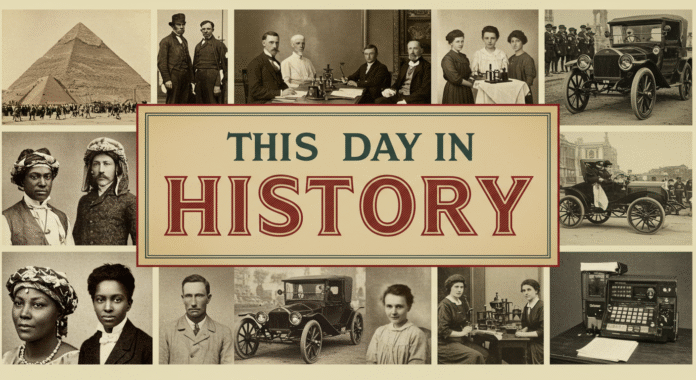1. 1944 – D-Day: Allied Forces Invade Normandy
On June 6, 1944, more than 156,000 Allied troops stormed the beaches of Normandy, France, in the largest amphibious invasion in military history. Known as D-Day, this marked the beginning of Operation Overlord and a critical turning point in World War II. Under General Dwight D. Eisenhower’s command, soldiers from the United States, United Kingdom, Canada, and other nations braved enemy fire, rough seas, and heavily fortified German defenses.
The victory came at a heavy price—over 4,000 Allied soldiers were killed that day. But it successfully established a Western front, accelerating the liberation of Western Europe from Nazi control.
Why It Matters:
D-Day symbolizes international cooperation in the face of tyranny and remains a powerful reminder of sacrifice and courage. The beaches of Normandy are now sacred ground, drawing millions of visitors each year.
Lesser-Known Fact:
Meteorologists played a critical role—D-Day was originally set for June 5 but delayed due to weather. A narrow window opened on June 6, which changed history.
2. 1933 – First Drive-In Theater Opens in New Jersey
On this day in 1933, Richard Hollingshead opened the first drive-in movie theater in Camden, New Jersey. He tested the concept by mounting a projector on his car and showing films on a screen nailed to trees in his backyard. The idea quickly took off, blending America’s car culture with entertainment.
The drive-in’s slogan, “The whole family is welcome, regardless of how noisy the children are,” struck a chord during the Great Depression.
Why It Matters:
The drive-in revolutionized American entertainment and became a cultural icon of the 1950s and ‘60s. It also saw a surprising revival during the COVID-19 pandemic as a socially distanced venue.
Lesser-Known Fact:
Admission to the first show was 25 cents per car and 25 cents per person. You could enjoy a movie for less than a dollar.
3. 1968 – Robert F. Kennedy Dies After Assassination Attempt
Senator Robert F. Kennedy died on June 6, 1968, a day after being shot at the Ambassador Hotel in Los Angeles. A leading Democratic presidential candidate and former U.S. Attorney General, RFK had just delivered a victory speech in the California primary when he was gunned down by Sirhan Sirhan.
RFK’s assassination came just two months after Martin Luther King Jr.’s death, deepening the national trauma of 1968.
Why It Matters:
Kennedy was a progressive force in American politics, advocating for civil rights, anti-poverty programs, and an end to the Vietnam War. His death altered the course of the Democratic Party and intensified calls for better protection for political leaders.
Lesser-Known Fact:
One of the first people to reach Kennedy after he was shot was a young campaign worker named Juan Romero, who comforted him in his final moments.
4. 1984 – The Video Game Industry Bounces Back
June 6, 1984, marked a major moment in the recovery of the U.S. video game industry, with Nintendo unveiling the NES (Famicom) in North America ahead of its release. While the full launch wouldn’t come until 1985, Nintendo began testing U.S. markets after a major crash in 1983 that had devastated the gaming world.
With Mario, Zelda, and a new business model, Nintendo would reignite the industry.
Why It Matters:
The NES redefined home entertainment and created a multi-billion-dollar industry. It introduced quality control measures that set standards still followed today.
Lesser-Known Fact:
The NES was initially marketed as a toy, not a video game console, to bypass negative perceptions of home gaming systems.
5. 1991 – Michael Jordan Wins His First NBA Championship
On June 6, 1991, Michael Jordan and the Chicago Bulls defeated the Los Angeles Lakers to win their first NBA Championship. The series ended 4–1, with Jordan earning Finals MVP honors. His iconic performance—including “The Switch Hands Layup” in Game 2—cemented his status as a legend.
This title launched the Bulls’ dynasty and kicked off the first of two three-peats in the 1990s.
Why It Matters:
Jordan’s first title was more than just a win—it was a turning point for the NBA, ushering in a global era of basketball fandom and elevating the sport to new cultural heights.
Lesser-Known Fact:
Jordan cried while holding the championship trophy, saying it was for his late father—though James Jordan wouldn’t be murdered until 1993, the moment still signified deep emotion.



